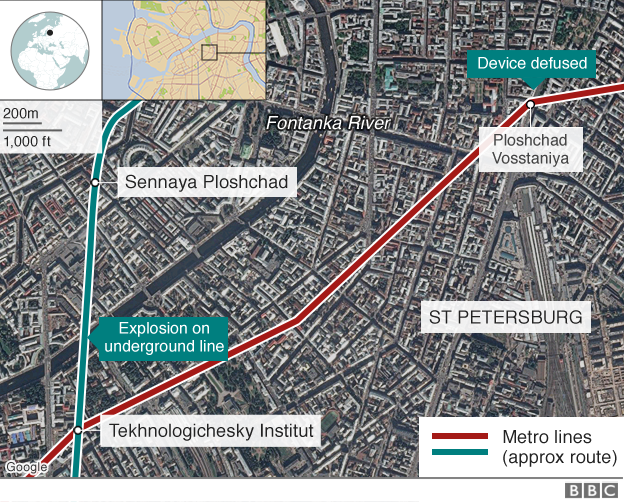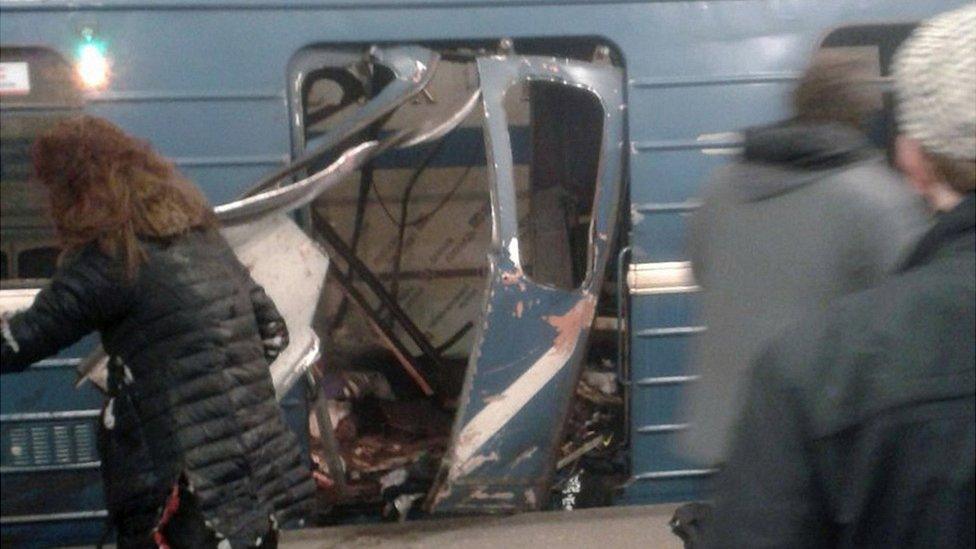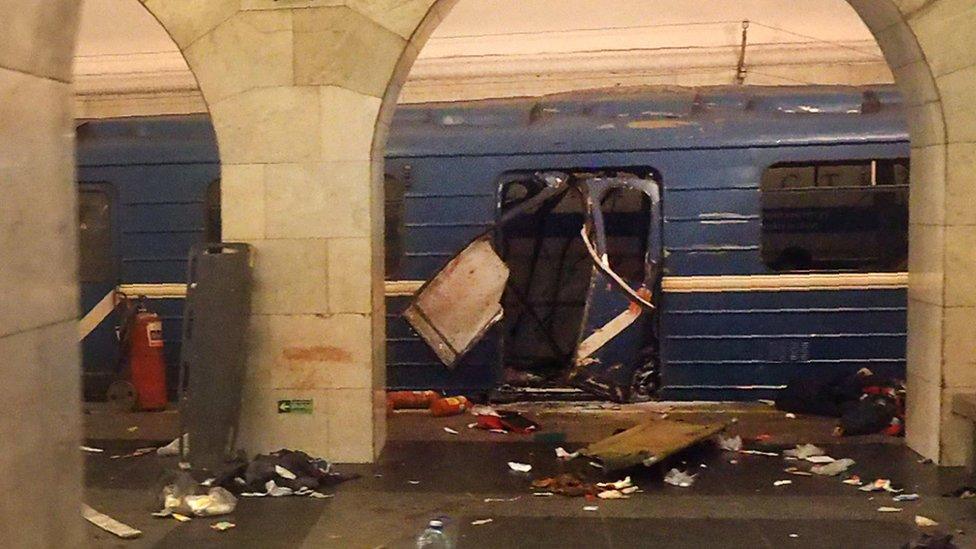St Petersburg metro bombing a possible suicide attack
- Published
Footage shows passengers leaping from the wreckage in the minutes after the blast
The St Petersburg metro explosion was caused by a bomb possibly detonated by a man whose body parts were found on the train, Russian investigators say.
Monday's blast between two stations killed 14 people and injured almost 50.
Kyrgyzstan's security service named the suspect as Akbarzhon Jalilov, who was born in the Kyrgyz city of Osh in 1995 and had obtained Russian citizenship.
His name was later confirmed by Russian investigators, who said he also planted a second bomb that did not explode.
In an earlier statement, the Russian state investigative committee said it had concluded the train bomb may have been detonated by a man whose remains were found in the carriage.
No group has said it was behind the bombing.
In other developments:
Details are emerging of the victims, 10 of whom have now been named by Russia's investigative committee. They include two teenagers and a man in his 70s
Further information has been disclosed about the train driver hailed a hero (see below in this article)
Health Minister Veronika Skvortsova said the death toll had risen from 11 to 14 after three people died in hospital
Foreign Minister Sergei Lavrov, at a meeting with his Kyrgyz counterpart Erlan Abdyldayev, said the attack "once again shows the importance of stepping up joint efforts to combat this evil"
Authorities in St Petersburg have declared three days of mourning

A city on edge: By Sarah Rainsford, BBC News, St Petersburg

The metro here is open again, but passengers heading into the stations at the heart of the attack pass a huge pile of flowers. People here at Sennaya Ploshchad have been adding to the shrine all morning, leaving notes and stuffed toys and lighting candles.
This is a city trying to get back to normal, but there is deep shock at what's happened.
I spoke to women in tears. One told me she felt she had to bring flowers because this attack was so awful, and her mother was horrified at how random the killing was. "Everyone I know is fine," Irina said. "But it could have been any one of us."
There were bomb scares on the metro system again this morning, and several stations were closed and cordoned off as security teams moved in. It is another sign that this is a city on edge now.

World leaders have rallied behind Russia in condemning the blast.
The White House said President Donald Trump had spoken to Mr Putin by phone and offered "full support" in bringing those responsible to justice
German Chancellor Angela Merkel described the blast as a "barbaric act"
UK Prime Minister Theresa May said she had written to President Putin to offer her condolences. "This shows the terrible terrorist threat that we are all facing," she added.

The blast occurred on Monday afternoon after the train had left Sennaya Ploshchad station.
Senior investigator Svetlana Petrenko told Russian media the train driver's decision to continue to the next station, Tekhnologichesky Institut, had almost certainly helped save lives, as it allowed people to be rescued quickly.
Train driver Alexander Kaverin told reporters: "I just followed the procedure. You will know that this isn't the first terrorist act that we've had, there've been explosions before, so smart people came up with smart procedures.
"And these procedures say that in this situation I had to take the train to the nearest station. This is what I did. The train kept moving. There was a bang and lots of dust, but the train kept on moving."
The discovery of an explosive device at another station, Ploshchad Vosstaniya, on Monday also suggested a co-ordinated attack.
Both Mr Kaverin and another employee who found the unexploded bomb would be rewarded for their actions, metro officials said.

Shifting tactics: By Abdujalil Abdurasulov, BBC Russia and Central Asia analyst

Several thousand fighters from Central Asia have joined militants in Syria and Iraq. Some are recruited from among migrant workers in Russia, who may be vulnerable to propaganda because of the injustice and abuse they face.
As part of shifting tactics, militants reportedly appeal to new recruits to support the "cause" at "home" as an alternative to joining the battlefront in Syria or Iraq.
The birthplace of the suspected bomber is reported to be Osh, Kyrgyzstan. Although this city is in the Fergana valley, where the role of Islam is particularly strong, it should not be perceived as a source of a growing "Islamic threat".
Islam in Central Asia is far more secular than in most parts of the Muslim world. Although the influence of the religion is certainly increasing, this is often mistakenly seen as a sign of the growing threat of violent radicalism, which effectively puts an equals sign between Islam and danger.
The reasons why Central Asians support violent Islamist groups are complex. Religion may not be necessarily a major one.
Per capita, more fighters have gone from some European countries, such as Belgium, to join militant groups in Syria and Iraq. And Belgium's Muslim population is far smaller.
Read more: Why Central Asians are lured by IS
- Published4 April 2017

- Published19 April 2017

- Published4 April 2017